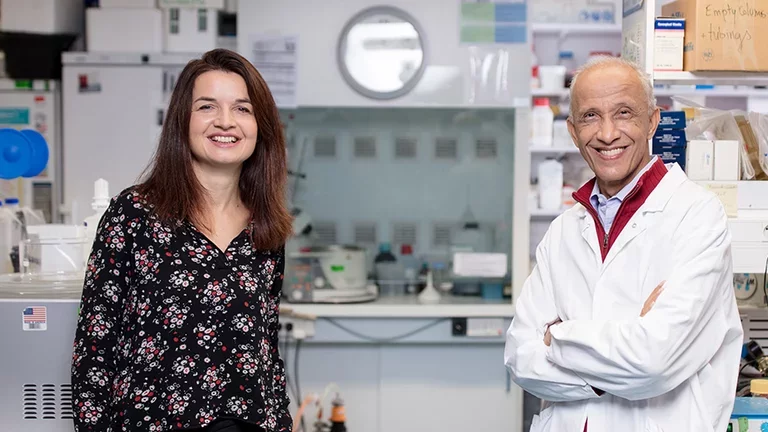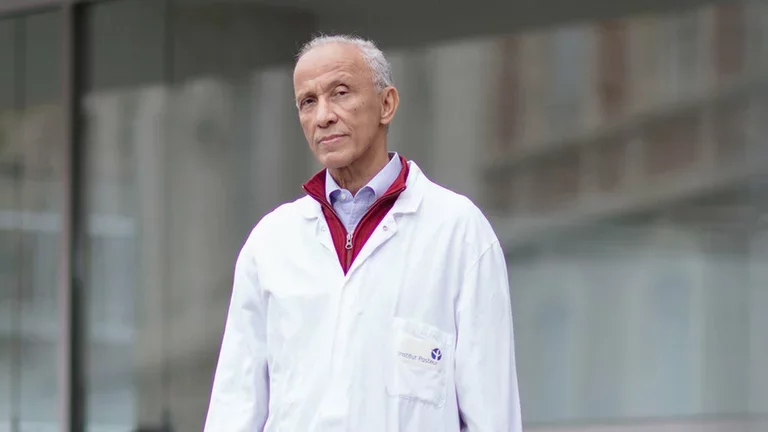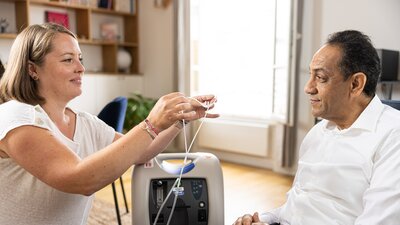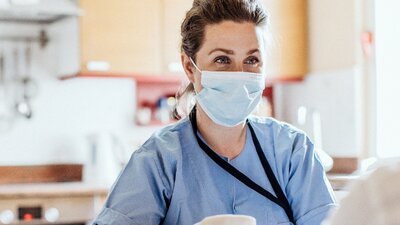COVID-19: Contributing to research against the disease
Published on December 04, 2020
5 minutes

In March 2020, the COVID-19 pandemic plunged most of the world into an unprecedented health crisis. To respond to this emergency, the Air Liquide Foundation created an exceptional fund of over 2 million euros to support scientific research organizations and partner associations. Lhousseine Touqui, Research Director at the Institut Pasteur, received funding through this initiative for his research project on the respiratory aggravating factors of COVID-19. His work is supported by Géraldine Farjot, Director Early Drug Development at Air Liquide Healthcare.
Interview with Lhousseine Touqui, Research Director for respiratory infectious diseases at the Institut Pasteur
Can you tell us a bit about your research?
I mainly work on cystic fibrosis, a genetic disorder characterized by chronic and often incurable lung infections. My goal is to identify the mechanisms involved in these infections, in order to develop treatment options that can help patients with this disorder combat the infections. More recently, I've been working on a project related to COVID-19, in collaboration with colleagues from Inserm and Saint-Antoine and Saint-Joseph Paris Hospitals. The idea is to understand the respiratory aggravating factors of COVID-19 using particular inflammation biomarkers (which have yet to be studied), in order to predict the disease's evolution and develop treatment strategies.
What does this COVID-19 project mean for you?
This project allows me to “contribute toward a better understanding” of the disease, with two main focuses. Firstly, understanding the mechanisms that predispose patients to a worse survival prognosis. Secondly, understanding how to block these mechanisms, which would help combat the COVID-19 virus, and possibly help combat other viruses from the same family that could lead to epidemics in the future. This project also combines basic research and clinical research, as we're studying samples from COVID-19 patients, which aren't always easy for researchers to obtain. This study raises important ethical questions that need to be factored. Patients must give their consent before we can use their samples or publish any results from them in specialized journals. The samples are also potentially dangerous (since they contain viruses), which requires us to impose more stringent measures related to their use (strict health and safety standards) as well as their traceability (labeling and storage).There are also intellectual property issues (potential patents) tied to the results and their use in treatment.
What does a group like Air Liquide bring to you?
The support of the Air Liquide Group, through its Foundation, is immensely important to the Institut Pasteur, as it provides funding for research on lung conditions, which is my team's specialty. In addition, the Air Liquide Foundation has been highly responsive and effective during the current health crisis: our COVID-19 research project was accepted in just three weeks! That's exceptional, since other funding bodies can take as long as several months.
Interview with Géraldine Farjot, Director Early Drug Development at Air Liquide Healthcare
What is your role in this project?
My role is to evaluate this project supported by the Air Liquide Foundation. It's an initiative that uses patient samples to conduct clinical exploratory research. As an expert for the Foundation, my job is to ensure the scientific and medical consistency of the project. During follow-up, I might also provide advice to optimize its impact.
What are the goals of this project?
The research team is attempting to measure biological markers on around 30 patients at different stages of the disease. Their goal is to identify a method for predicting the disease's evolution and to develop treatment strategies to prevent respiratory deterioration. To reach this goal, the team is conducting blood tests to study various biomarkers (cytokines, micro-RNA, lipids) and to attempt to find a “signature” for deteriorating inflammatory reactions following COVID-19 contraction. More specifically, they're examining whether a treatment that's already under development to treat another disease with the same type of cytokine storm could be used against the Coronavirus.
In your opinion, what is the main advantage of this project?
The main advantage of this project is the cooperation between researchers at the Institut Pasteur and Inserm and doctors at Saint-Antoine and Saint-Joseph Hospitals. This researcher/doctor partnership is bound to lead to something fruitful. Usually, researchers use laboratory cell models or animal models for their research. With this project, they have access to patient samples, ensuring that their research will reflect the reality of the disease as closely as possible.
10 SCIENTIFIC RESEARCH PROJECTS AND 23 SOCIAL PROJECTS SUPPORTED BY THE FOUNDATION SINCE MARCH 2020
Since the start of the pandemic, the Air Liquide Foundation has been working to fight COVID-19 and its effects. Its main concern is to advance research in order to better understand and treat the virus and support the populations most vulnerable to the health crisis. These two goals harken back to the Foundation's longstanding missions: “Breathing Better” and “Acting within Local Communities”. As part of the COVID-19 Initiative, the Foundation has supported 10 scientific research projects and 23 social projects since March 2020. The research projects are focused on three categories: better understanding the virus, how it affects the lungs, and how it is transmitted; improving care for patients with respiratory failure; and determining its long-term effects on the lungs.




